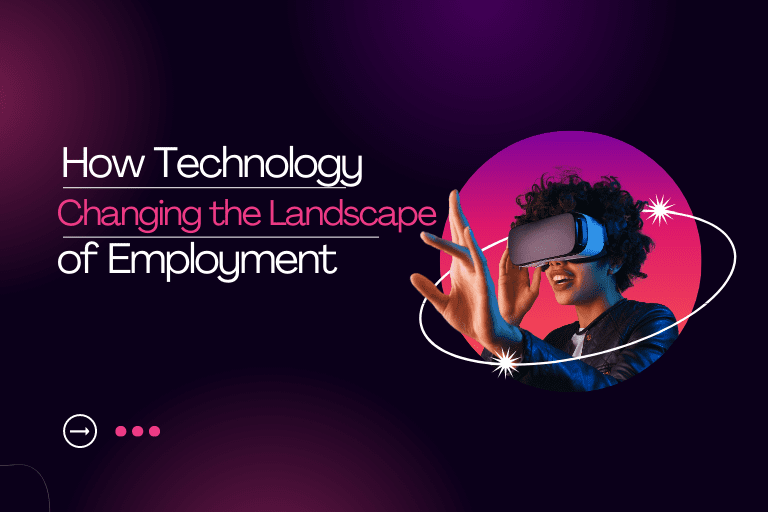Have you noticed the evolving trends of business, work, and trade with the improvisation and relentless growth of technology? We understand that urge to know it all, and our blog will assist you in doing so!
Technology has changed many parts of our lives; involving industries like food, entertainment like movies, gaming like escape room games, and other sectors with the world of work being the dominant one. As we move closer to 2023, it’s becoming clearer that the fast pace of technological change is influencing the prospects of work. From automation to artificial intelligence (AI), technological advances are radically changing the way people work. This presents both possibilities and problems for both workers and businesses.
Automation And AI Are Changing Jobs and Responsibilities
The rise of technology and artificial intelligence is one of among the most important trends for the coming years of work. Machines and programs are getting better and better at doing things that people used to do. People are worried about losing their jobs because of this change, but it’s important to remember that these changes are also creating new possibilities.
Manual Labour Automation
Automation and artificial intelligence are especially common in fields like production, each of shipping, and dealing with customers. Machines and self-driving cars are taking over jobs that are boring or hard to do physically. This frees up people to work on more complicated and innovative projects. This change increases output, cuts costs, and makes the workplace more efficient overall.
The Rise of Remote Work and Flexible Arrangements
The rise of online work and open schedules is a significant component of the probable future of work. The COVID-19 pandemic sped up the spread of virtual work, and its effects were expected to last long after the pandemic ends as we see it today. Improvements in interactions and teamwork tools have made it simpler for employees to work from anywhere. This has broken down regional boundaries and given companies access to a worldwide talent pool.
- Advantages of Work from Home
Remote work has many perks, such as more freedom, less time spent traveling, and a better mix between work and home. It can also help both companies and workers save money. Businesses can save money on the workspace as well as expenses connected to it, and workers can save money on conveyance and other charges related to travel. Working from home also helps the environment because it cuts down on carbon pollution from daily travels.
- Problems with Work from Home
Working from home also has problems that need to be fixed. When workers are in different places, it can be harder to keep the team together and get people to work together. To deal with these problems, companies need to use good tools for communication and teamwork and build a helpful virtual work setting. Also, working from home can make it hard to tell the difference between professional and private lives, which can lead to problems like stress and less harmony between work and personal life. In remote job settings, it’s important to set clear limits and put your health first.
The Gig Economy: Taking Advantage of Flexibility and Independence
The gig economy is a further development that will affect how people work in the future. It means that short-term contracts and independent work are common, which lets people work on projects instead of sticking to full-time work. Modern platforms and web-based markets have made it more straightforward for freelancers to find work and meet with clients or businesses that need their skills.
- Adaptability and Flexibility
The gig economy gives workers autonomy and adaptability by letting them choose their own projects and clients. It also gives people a way to make money with their skills and knowledge outside of standard job frameworks.
- Concerns and Fair Treatment
But the gig economy also makes people worry about work stability, perks, and fair wages. Most of the times, freelancers don’t have the same perks and legal rights as full-time workers, like health insurance, retirement schemes, and legitimate protections. Policymakers and groups need to deal with these problems while discovering ways to handle gig workers fairly and equally.
Emerging Technologies: Blockchain, VR, and AR
Along with to the above trends, emerging innovations like bitcoin, virtual reality (VR), and augmented reality (AR) have the potential to change the future of business. These tools could change the manner in which we work and transform how many businesses work.
- Blockchain Computing
Blockchain computing has the ability to make sales and transactions safe and clear, doing away with the requirement for intermediaries. It can change businesses like banking, logistics, and rights to intellectual property, making them more reliable and functional.
- Worlds of Virtual Reality (VR) and Augmented Reality (AR)
VR and AR can revolutionize academics and educational opportunities by letting recipients learn new skills and gain fresh information in realistic and dynamic worlds. These tools can be used in fields like healthcare, business, and education to help folks learn more and do better at their jobs. AI and VR have also seen a great emergence in the entertainment of individuals for recreation and pastimes like in escape room games that serve as a relief from hectic work schedules to give them a fresh start.
Conclusion
Technology is shaping the future of work, which presents both possibilities and obstacles. Automation, remote employment, and the gig economy all offer fresh approaches to work, but it’s important to remember that humans are still the most important part of the workplace. Critical thinking, creative thinking, interpersonal skills, and the ability of transition will continue to be very valuable. As the employment landscape changes in 2023 and in the future, it will be important for people, groups, and legislators to respond to and take advantage of the possibilities that come with technological advances.
Unlock Full Article
Watch a quick video to get instant access.


Social Media